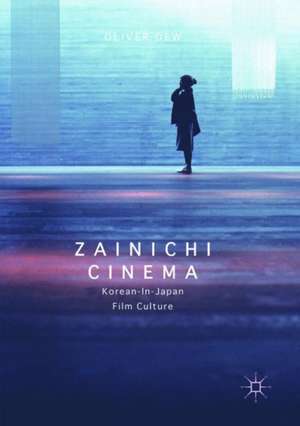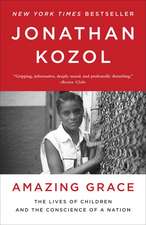Zainichi Cinema: Korean-in-Japan Film Culture
Autor Oliver Dewen Limba Engleză Paperback – 7 iul 2018
| Toate formatele și edițiile | Preț | Express |
|---|---|---|
| Paperback (1) | 579.84 lei 6-8 săpt. | |
| Springer International Publishing – 7 iul 2018 | 579.84 lei 6-8 săpt. | |
| Hardback (1) | 701.40 lei 6-8 săpt. | |
| Springer International Publishing – 17 noi 2016 | 701.40 lei 6-8 săpt. |
Preț: 579.84 lei
Preț vechi: 682.16 lei
-15% Nou
Puncte Express: 870
Preț estimativ în valută:
110.99€ • 120.60$ • 93.29£
110.99€ • 120.60$ • 93.29£
Carte tipărită la comandă
Livrare economică 21 aprilie-05 mai
Preluare comenzi: 021 569.72.76
Specificații
ISBN-13: 9783319822075
ISBN-10: 3319822071
Ilustrații: XIV, 235 p. 30 illus. in color.
Dimensiuni: 148 x 210 mm
Greutate: 0.3 kg
Ediția:Softcover reprint of the original 1st ed. 2016
Editura: Springer International Publishing
Colecția Palgrave Macmillan
Locul publicării:Cham, Switzerland
ISBN-10: 3319822071
Ilustrații: XIV, 235 p. 30 illus. in color.
Dimensiuni: 148 x 210 mm
Greutate: 0.3 kg
Ediția:Softcover reprint of the original 1st ed. 2016
Editura: Springer International Publishing
Colecția Palgrave Macmillan
Locul publicării:Cham, Switzerland
Cuprins
Introduction: Koreans-in-Japan, on-screen.- 1. 1968/2004: Bridging Imjin River.- 2. Screening the Zainichi subject.- 3. Excavating the Zainichi yakuza film.- 4. ‘Pacchigi Power!’: the ‘coming out’ melodrama.- 5. Arirang kamikaze: screening the memory wars.- 6. Intimate ethnographies: three family portraits.- Conclusion
Notă biografică
Oliver Dew was awarded his PhD by Birkbeck College, University of London, in 2012. He was a JSPS Post-Doctoral Research Fellow at Meiji Gakuin University, Tokyo 2012-14. His articles have been published in the Journal of Japanese and Korean Cinema (2014), Nihon eiga wa ikiteiru (2010), and New Cinemas (2007).
Textul de pe ultima copertă
This book examines how filmmakers, curators, and critics created a category of transnational, Korean-in-Japan (Zainichi) Cinema, focussing on the period from the 1960s onwards. An enormously diverse swathe of films have been claimed for this cinema of the Korean diaspora, ranging across major studio yakuza films and melodramas, news reels created by ethnic associations, first-person video essays, and unlikely hits that crossed over from the indie distribution circuit to have a wide impact across the media landscape. Today, Zainichi-themed works have never had a higher profile, with new works by Matsue Tetsuaki, Sai Yoichi, and Yang Yonghi frequently shown at international festivals. Zainichi Cinema argues that central to this transnational cinema is the tension between films with an authorized claim to “represent”, and ambiguous and borderline works that require an active spectator to claim them as images of the Korean diaspora.
Caracteristici
First book-length study devoted to Korean-in-Japan (Zainichi) Cinema Explores the critical and curatorial impulses through which categories and canons of film are created in Zainichi cinema Focuses on ambiguous works that require an active spectator to make them legible as images of Koreanness









